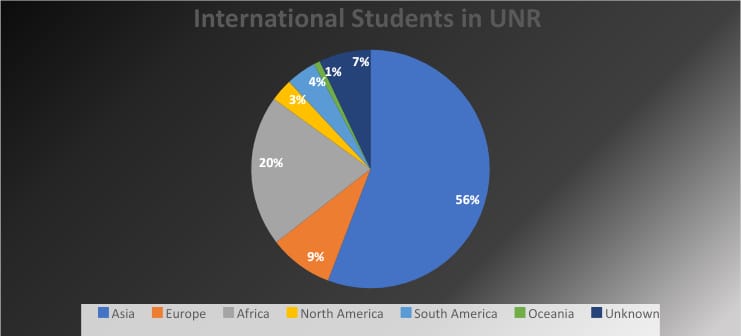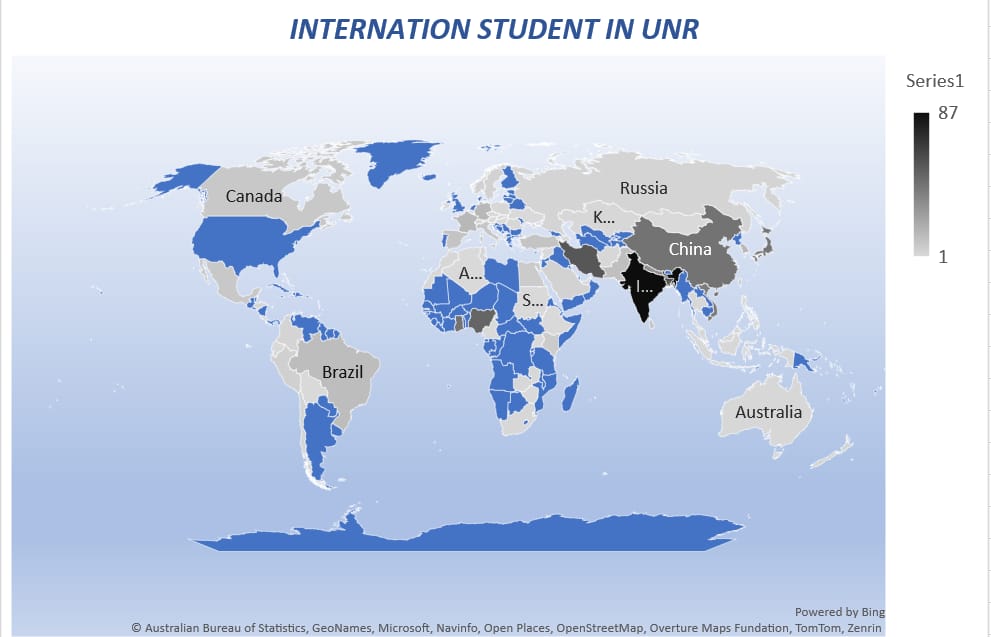“I’ll never forget this day. I was in class, standing in front of my group, ready to give my part of the presentation. But when I opened my mouth, the words just wouldn’t come. I couldn’t find the right English words, and the silence in the room felt embarrassing. Everyone was staring at me, and I could see the confusion on their faces, the professor likewise. I tried to explain, but the more I stumbled, the worse I felt. I could feel my heart pounding and my face burning. That moment stayed with me. I felt like I didn’t belong here, like I was failing, not just in class but in life. It was the start of a dark period for me—struggling to communicate, feeling isolated in a place where I was supposed to thrive.”

This is the story of Elshoubry, an international student in UNR who arrived from Egypt to the United States in order to further his academics. Many international students have experienced mental health issues brought about by the complexities and dynamics of a new environment.
Being an international student can be a rewarding experience, but it also comes with its own set of challenges. Inarguably, one of the biggest mental burdens international students have experienced as students is feeling constantly out of place and struggling to adapt to a new culture and way of life. Many go through the pressure to excel academically in order to justify the time and money spent on studying abroad. This often led to feelings of insecurity and self-doubt, especially when compared to local students who may have a better understanding of the educational system and resources available.
According to Statista, the United States has long been a popular destination for international students seeking higher education opportunities. The United States hosted a record-breaking 1,126,690 international students from over 210 places of origin during the 2023/2024 academic year, marking a 7% increase from the previous year, when 948,519 international students were studying in the United States. According to the senior institutional analyst in the University, the University of Nevada, Reno currently holds about 739 International students representing from over 30 countries.


Quagmire of Mental Health Amongst International Students
The fear of failure and disappointing their family and themselves adds an extra layer of stress to an already challenging situation. In lieu of this, many international students have lost their lives because of the sheer feeling of not living up to task or meeting up to the expectations of onlookers. According to a study in the International Journal of Environmental Research and Public Health, International students are at greater risk of facing mental health challenges than local tertiary students considering they live away from home and navigate the new culture.

“The hardest struggle as an international student is surviving grad school due to the inability to find an internship during the summer. I struggled to pay my rents and buy groceries and this led to a mental break down for me. As an international student, you are viewed differently by different organizations because you don’t have the American work culture.” This was the statement of Connie, an international student from Kenya.
Tragically, in the past two years, more students have lost their lives while studying in the US than ever before. The loss of international students in the US serves as a reminder of the risks and uncertainties that come with studying abroad. To further buttress, being far away from home and loved ones can also take a toll on the mental health of international students, and this brings about feelings of loneliness and isolation, which can be difficult to overcome, especially when faced with the added stress of navigating a new country and academic culture. It can be hard to find a support system and feel a sense of connection with others, which can exacerbate feelings of anxiety and depression. Overall, the mental burden of being an international student is a real and significant challenge that requires resilience, self-care, and support from others to overcome.
Universities and host communities need to prioritize the safety and well-being of all students, regardless of their nationality. By creating a welcoming and inclusive environment, and providing support services for international students, we can help prevent future tragedies and ensure that students from around the world can pursue their educations in a safe and supportive environment.
“I was very sad when I came over here and that was due to my fears of excelling in the courses here. I spoke to the professors, but they couldn’t offer any solution. Although my coordinator tried, they still didn’t solve the problems I had. I had to call home to speak to my parents before I felt safe with my career and future.” Joel, an exchange student from Switzerland said

The mental health needs of international students are an important aspect of their overall well-being and success during their time studying abroad. Adjusting to a new country, culture, and academic environment can be overwhelming and stressful for many international students, leading to mental health concerns such as anxiety, depression, and feelings of isolation. Universities and colleges need to provide adequate support and resources to address these needs and ensure the mental well-being of their international student population.
Mitigating Mental Health Struggles Amongst International Students
According to Dr. Hilary Son, Director of Clinical Services and a Licensed Psychologist at UNR, one way to address the mental health needs of international students is to offer culturally sensitive counseling services. Many international students may come from countries where mental health is stigmatized or not openly discussed, so it is important to have counselors who are trained to understand and respect cultural differences. “In most cases, students don’t know how to communicate with their professors, how to ask for their rights and navigate how relationships can work in the American context, and this impact their mental health negatively.” She noted. By providing counseling services in multiple languages and with counselors who are familiar with the unique challenges faced by international students, universities can create a safe and inclusive space for students to seek help and support. “The issues that I see more with international students do not have much support due to the barriers of culture or shame that stems from their background predispositions.” Dr. Hilary stated.
In addition to counseling services, universities can also offer support groups, workshops, and mental health awareness programs specifically tailored for international students. There are mental health cases both among international students and domestic. However, with international students, it’s a different struggle. These programs can help students develop coping strategies, build social connections, and learn more about mental health resources available to them. By creating a supportive community and promoting mental health education, universities can help international students navigate the challenges of studying abroad and promote their overall well-being. Dr. Hilary Son noted that due to the insights from our discussion, she will set up a program with the OISS to set up training for international students on how to communicate with professors. Addressing the mental health needs of international students is crucial in ensuring their academic success and overall happiness during their time studying abroad.
By: Abdulmalik Adetola Lawal